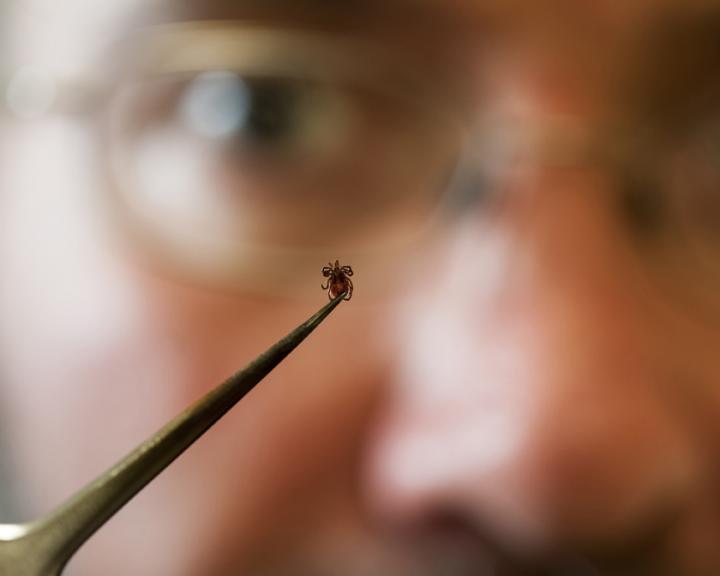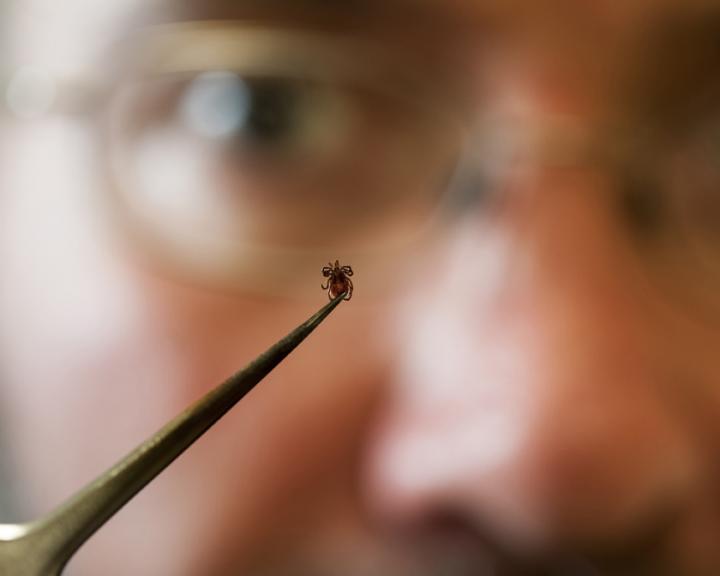
Credit: UMass Amherst
AMHERST, Mass. – A recent report from the Centers for Disease Control and Prevention (CDC) that warns of a recent surge of tick-borne disease incidence in the United States was no surprise to Massachusetts State Public Health Veterinarian Dr. Catherine Brown and microbiology professor Stephen Rich, director of the Laboratory of Medical Zoology (LMZ) at the University of Massachusetts Amherst.
For years, they have used data from the LMZ's tick-testing service, TickReport, to track the incidence and spread of Lyme disease and the introduction of new bacterial and viral tick-borne illnesses such as the Borrelia miyamotoi and Powassan virus in the state. What did come as a pleasant surprise this month, however, is a new $100,000 grant from the state's public health department, using CDC funding, to subsidize the cost of tick testing for Massachusetts residents through a contract with the LMZ.
As Rich explains, the $100,000 subsidy will allow the LMZ to provide tick testing for just $15 for Massachusetts residents for a limited time, and a limited portion of that funding will be devoted to testing for Powassan virus. The funds will be used up quickly, he predicts. "We anticipate that this program will be over by early to mid-July, the subsidy is really going to go fast."
Brown says of the new grant and statewide project, "Public health benefits from the data obtained from tick testing and from the educational outreach associated with using the TickReport service. We rely on this tick testing to identify any new tick-borne illnesses and to understand the prevalence of the current tick-borne diseases. We are pleased that this funding will be used to support the LMZ's activities."
Rich says, "It is extremely welcome to see that tick-borne illness has definitely moved up the CDC's list of priorities. It's also great that state and federal agencies are recognizing the relevance of our crowd-sourced passive surveillance. Not only will this make TickReport more accessible and affordable, it is also a recognition by the CDC of the value of tick testing as part of a comprehensive approach to tick-borne disease threats."
A major goal is to encourage more TickReport participation from residents in under-represented places in Massachusetts, he adds. "So we're hoping to get word out to western Massachusetts towns in particular about this limited-time offer. The funds will be used to reduce the cost to residents, but once the money is expended, normal prices will apply."
Specifically, $50,000 of the grant funds will be used to cover the full cost of Powassan virus testing for all Massachusetts residents on the first 1,000 TickReport orders submitted, while the other $50,000 will be used to offset the cost of TickReport standard DNA testing for residents in towns that do not currently have a partnership arrangement with the LMZ or public health department, Rich adds. The aim is to enhance the coverage of surveillance that TickReport offers.
As a result of years of statewide surveillance through LMZ tick testing, the microbiologist points out, public health officials have a much better picture of the tick-borne disease situation in Massachusetts. For example, data from Cape Cod show a high tick bite incidence over many months in Barnstable County. Also, the pathogen Anaplasma is not seen much in Franklin County in the western part of the state, but is often observed in Barnstable. Across the state, mid-November is one a the peak periods for ticks submitted, much later than many people expect.
TickReport, which has tested ticks from all 50 states, confirms receipt of ticks by email and guarantees confidential test results within three business days. Test results used for passive surveillance of disease-causing microbes by town or across the state, for example, is kept strictly anonymous.
Rich says the volume of ticks tested has risen steadily since LMZ began testing in 2006 to about 14,000 in 2017, and with the new federal/state subsidy he anticipates that number to reach 18,000 to 20,000 this year.
"But it may shoot up much higher," he adds. "In 2014 when we had the last big state subsidy, the volume of tick tests shot up by three or four fold in participating towns. The good news is that increased volume will help us to reduce our fees in the same way as the 2014 increase did. In 2014 the cost of the basic first tier test was $140, and because of the volume savings, that is now $50."
The LMZ is entirely non-profit, the director point out, and any surplus funds are turned into support for educational materials, a tick hotline, research on ticks and tick-borne disease, and a soon-to-be-released mobile app. The mobile app will allow people from anywhere in the United States to send a good-quality photo to the lab for identification at no charge. "This is to help people who can't afford a test," Rich says. "They can at least get accurate information on the species." The app is called "TickReport" and will be freely available wherever phone apps are sold.
At present, the LMZ offers 23 different tick tests in three tiers: a standard $50 DNA package which tests the most common bacterial and protozoan pathogens, a $100 DNA+RNA package which adds viruses, and a $200 comprehensive package that extends testing to very rare pathogens like Bartonella.
###
Media Contact
Janet Lathrop
[email protected]
413-545-2989
@umassscience
http://www.umass.edu
Original Source
http://www.umass.edu/newsoffice/article/state-public-health-department-umass





